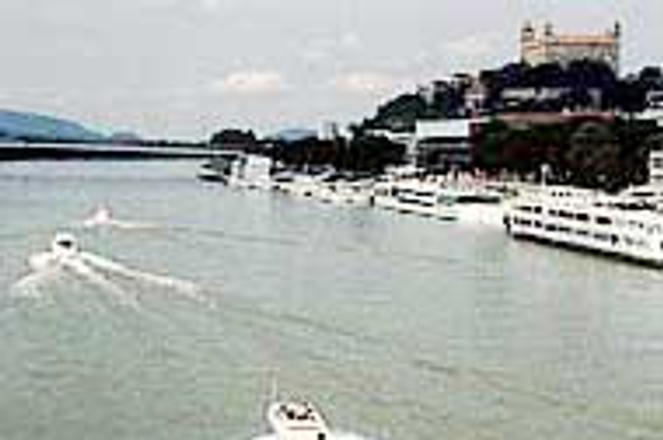An environmental group is worried development on the Danube will damage flora and fauna.photo: Ján Svrček
THE WORLD Wide Fund for Nature (WWF) is warning of serious ecological problems in areas along the Danube in Slovakia if plans for developing shipping on the river go ahead.
In a report to be delivered to the European Commission and the governments of countries through which the river runs, the environmental group says that "vital wetland ecosystems" will be threatened if plans are approved to construct new canals, dams and the deepening of parts of the river.
It also claims that there will be even greater pressure on species, a decrease in the availability of drinking water, and increased levels of chemicals in the river.
The plans, which include not just the construction of a new canal stretching from the Black Sea to the North Sea but the construction of new navigation lanes in the Bratislava-Budapest section of the river, have been developed by bodies including the European Commission, national governments bordering the Danube, and the Budapest-based inter-governmental Danube Commission.
They are being heavily backed by business lobby groups from the Czech Republic and Austria, says the WWF.
Slovakia has four 'hotspots' identified by the WWF that will be affected if the project is implemented.
The planned canal is of particular importance to the future of some ecosystems in Slovakia, threatening the natural habitats of a number of species.
The WWF claims that nearly one million acres of protected river sites in Germany, Poland, the Czech Republic, Slovakia and Austria will be destroyed if the canal is built.
"The Danube Oder-Elbe canal will cause serious problems. If it goes ahead it will affect 400,000 hectares of land in Slovakia," Paul Csagoly, spokesman for the WWF's Danube Carpathian Programme, told The Slovak Spectator.
Development of shipping and navigation on Europe's second-longest river has been supported for many years by a number of shippers.
Many companies found themselves under extreme financial pressure after Nato's bombing of strategic sites on the lower part of the river in the 1999 Kosovo conflict made some shipping and navigation impossible. Routes only fully reopened last year.
The WWF maintains that while it supports shipping and navigation on the river, much of the development planned for the Danube is unnecessary. It argues that the river should not be developed for existing ships, but that smaller ships be used for transporting goods.
"We understand the need for economic development but it needs to be ecologically sound. We're all for shipping and navigation on the Danube, in a lot of ways it's more ecologically sound than trucking, but the plans want to see the river changed. The river does not need to be changed, the boats do," said Csagoly.
"Experiences on the Rhine showed a loss of the bulk transport that had been carried out on it for years, but that was made up for on smaller transports and container shipping," he added.
Under the plans the river will be made deeper to accommodate larger ships to carry bulk transport. However, the report claims that transport of bulk goods is declining and that the deepening of the river to 3.5 metres makes no economic sense, and will simply wreak ecological havoc.
"The plans for the Danube are not only against common sense, but they also conflict with national, international and EU nature protection regulations, and directly contradict recent commitments in the region," the WWF said in a statement.
The Environment Ministry said it had not yet received the report. However, other agencies working with the ministry said the plans were unlikely to all be approved.
"I think the economics of some of the projects will see them stopped. There's no need for a new canal. A lot of the transporting of goods is done by train and trucks already and there is an under-used canal on the minor Rhine, which runs into the Danube. Why should another one be built if there is already an under-used one?" said Michal Derej, coordinator at the Danish Assistance Project.
He added: "It would just be throwing money out of the window."
He also warned, though, that development projects already underway along the Danube in Slovakia were threatening river ecology.
"There is a lot of development here already that is wild and unregulated. For instance, the building of houses down near the Gabčíkovo hydroelectric dam. This is not regulated properly, and there are more plans for that area," he said.

